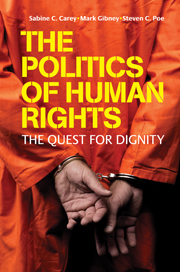Book contents
- Frontmatter
- Contents
- List of text boxes
- List of figures
- List of tables
- List of abbreviations
- Introduction
- Part I Human rights and state responsibilities
- 1 The concept of human rights
- 2 State responsibilities
- 3 Rights with responsibilities
- Part II Empirical representations and explanations of human rights violations
- Part III Intervening and rebuilding in the wake of repression
- Bibliography
- Index
- References
3 - Rights with responsibilities
Published online by Cambridge University Press: 05 June 2012
- Frontmatter
- Contents
- List of text boxes
- List of figures
- List of tables
- List of abbreviations
- Introduction
- Part I Human rights and state responsibilities
- 1 The concept of human rights
- 2 State responsibilities
- 3 Rights with responsibilities
- Part II Empirical representations and explanations of human rights violations
- Part III Intervening and rebuilding in the wake of repression
- Bibliography
- Index
- References
Summary
One of the definitions of human rights that we presented in Chapter 1 was Michael Perry's notion that there are certain things that ought not to be done to people and certain other things that should be done. As we said then, these ‘things’ are generally what we mean by human rights. Perry approaches human rights on religious grounds. His conception of human rights is based on the idea that human beings are ‘sacred’, and because they are sacred they must be afforded certain protections. The secular approach puts forward that each and every human being possesses an inherent dignity. Human rights are the tools to respect and maintain this dignity.
In this chapter we examine the content and meaning of several specific rights, although it is important to understand that every human right is related to all others. We cannot cover the entire range of human rights, but we sample both categories of civil and political rights (CPR) and economic, social and cultural rights (ESCR), and outline the responsibilities and obligations that states have to protect those rights.
The first right we discuss is one that we have touched on previously, freedom from torture. One of the most publicized examples of torture in recent years has been the images of prison abuse – torture – at Abu Ghraib, where Iraqi citizens were subjected to severe physical and psychological pain and treated as disposable playthings for the amusement of US service personnel. After that we look at refugee protection.
- Type
- Chapter
- Information
- The Politics of Human RightsThe Quest for Dignity, pp. 70 - 99Publisher: Cambridge University PressPrint publication year: 2010



